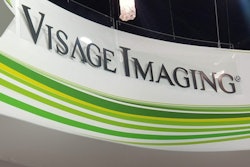
Hop on a bus or jump on the train if you really want to find out what's happening in imaging departments, Dr. Kath Halliday, president of the U.K. Royal College of Radiologists (RCR), told RSNA 2022 attendees at a special session held in Chicago on Monday.
Halliday and her team visited 143 radiology departments in England during their research for the Getting it Right First Time (GIRFT) scheme, traveling the length and breadth of the country, she said at the "U.K. Presents: Building and Sustaining Imaging Services" session.
"I absolutely loved it," she noted. "The best bit of it was meeting all the people working in the imaging department. I was welcomed absolutely everywhere."
 Dr. Kath Halliday says she doesn't mind train rides, but she got a bit sick and tired of staying in budget hotels.
Dr. Kath Halliday says she doesn't mind train rides, but she got a bit sick and tired of staying in budget hotels.The national initiative seeks to identify approaches from across the National Health Service (NHS) that improve outcomes and patient experience without requiring radical change or extra cash. The aim is to cut unwarranted variation by holding a mirror up to departments and demonstrating how they compare with others, Halliday explained.
Each hospital visit included a tour of the department and meetings with frontline clinicians and managers to identify and share not only areas of good practice but also problems to work on. Halliday and her colleagues then produced a written summary, gave feedback, and formed an implementation team.
The workforce is the biggest issue, and everyone is struggling for capacity, she said. "Virtually everyone is outsourcing and insourcing, giving extra shifts to staff and using locums."
Problems with digital systems and AI
Data are copious and inconsistent, particularly when it comes to interventional radiology, and the infrastructure for PACS and artificial intelligence (AI) is mixed. "Digital issues are holding us back," she commented. "Networks may smooth out capacity, but will not solve our problems."
Halliday, who is clinical director for radiology at Nottingham University Hospitals and former chair of the British Society of Paediatric Radiology, began her three-year term as RCR president in September 2022, and she plans to focus heavily on workforce issues, as well as information technology (IT).
"I think we are missing out, and we waste a lot of staff time with poor IT systems and interoperability and really quite basic things that we don't do in radiology departments," she said. "We don't really invest in the IT workforce or IT support in hospitals."
For example, the lack of online booking systems for patients makes it very inconvenient and difficult for them to fix and change the time of appointments. Also, the PACS manager in many U.K. hospitals is the same person who's trying to install new IT systems, but this is the same person radiologists have to call when they've forgotten their password.
Halliday is keen to make much better use of AI, but she's concerned the U.K. lacks the infrastructure or the staff to support their implementation. "I'd like to try to make that a bit easier and smooth the way. Radiologists could be the link between industry and all the innovators and the people at the frontline and to make that communication generally stronger, safer, and more innovative."
Good leadership is key and can be transformational by setting the tone and influencing the whole system, she said. Her advice is to work closely with your peers, be authentic, and try to understand how to influence processes.
"Some people do better at some things than others," Halliday said, noting that it is easy to keep staff if they enjoy coming to work and feel part of the community. "Looking above the parapet is essential."
 GIRFT team members Dr. Giles Maskell (AuntMinnieEurope.com columnist) and Lucy Beeley (group manager for radiology at Mid Yorkshire Hospitals NHS Trust) take a trip on a London bus during their research.
GIRFT team members Dr. Giles Maskell (AuntMinnieEurope.com columnist) and Lucy Beeley (group manager for radiology at Mid Yorkshire Hospitals NHS Trust) take a trip on a London bus during their research.Halliday acknowledged the support of Dr. Giles Maskell, past president of RCR, and orthopedic surgeon Prof. Tim Briggs, chair of GIRFT and NHS England national director for clinical improvement and elective recovery.
Drive for quality
At the same RSNA session, Dr. Raman Uberoi, RCR's medical director for professional practice, spoke about how the U.K.'s Quality Standard for Imaging (QSI) is driving service improvement by encouraging departments to scrutinize their processes and understand how to work toward best practice in all areas.
"Departmental delivery of imaging is covered by the QSI -- an overarching quality framework which enables both hospital departments and imaging networks to develop their services to the highest standards," noted a statement from the RCR. "The provision of sufficient trained personnel is a critical part of delivering a quality service, and initiatives which have been used to increase and upskill the U.K. imaging workforce are important here."
Dr. Priya Suresh, the RCR medical director for education and training, discussed workforce issues, and Dr. William Ramsden, RCR's vice president for clinical radiology, chaired the session.
The RCR's iRefer guidelines aim to provide evidence-based recommendations to ensure referrers request the most appropriate imaging investigations for their patients' clinical presentation, added the statement.



















